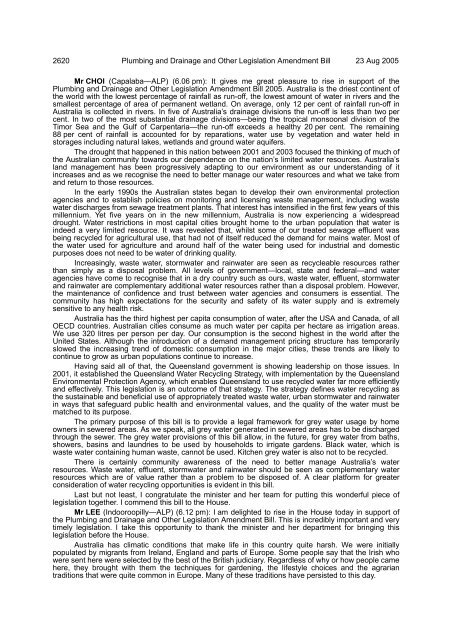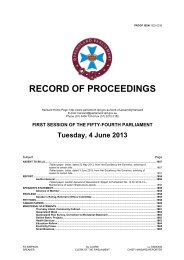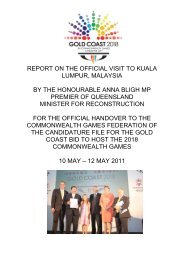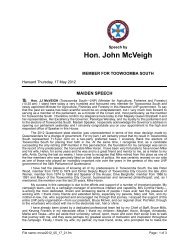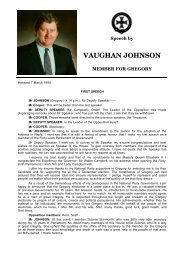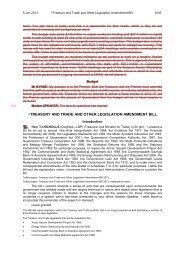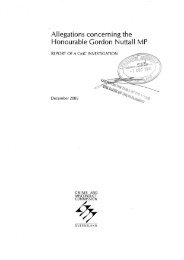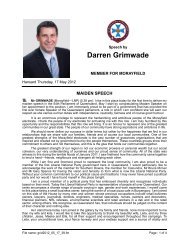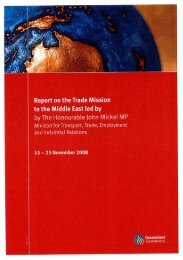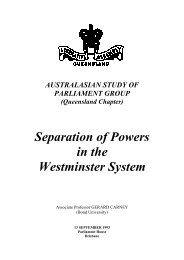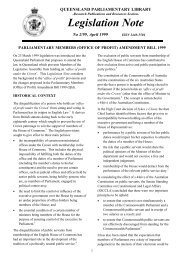weekly hansard - Queensland Parliament - Queensland Government
weekly hansard - Queensland Parliament - Queensland Government
weekly hansard - Queensland Parliament - Queensland Government
Create successful ePaper yourself
Turn your PDF publications into a flip-book with our unique Google optimized e-Paper software.
2620 Plumbing and Drainage and Other Legislation Amendment Bill 23 Aug 2005<br />
Mr CHOI (Capalaba—ALP) (6.06 pm): It gives me great pleasure to rise in support of the<br />
Plumbing and Drainage and Other Legislation Amendment Bill 2005. Australia is the driest continent of<br />
the world with the lowest percentage of rainfall as run-off, the lowest amount of water in rivers and the<br />
smallest percentage of area of permanent wetland. On average, only 12 per cent of rainfall run-off in<br />
Australia is collected in rivers. In five of Australia’s drainage divisions the run-off is less than two per<br />
cent. In two of the most substantial drainage divisions—being the tropical monsoonal division of the<br />
Timor Sea and the Gulf of Carpentaria—the run-off exceeds a healthy 20 per cent. The remaining<br />
88 per cent of rainfall is accounted for by reparations, water use by vegetation and water held in<br />
storages including natural lakes, wetlands and ground water aquifers.<br />
The drought that happened in this nation between 2001 and 2003 focused the thinking of much of<br />
the Australian community towards our dependence on the nation’s limited water resources. Australia’s<br />
land management has been progressively adapting to our environment as our understanding of it<br />
increases and as we recognise the need to better manage our water resources and what we take from<br />
and return to those resources.<br />
In the early 1990s the Australian states began to develop their own environmental protection<br />
agencies and to establish policies on monitoring and licensing waste management, including waste<br />
water discharges from sewage treatment plants. That interest has intensified in the first few years of this<br />
millennium. Yet five years on in the new millennium, Australia is now experiencing a widespread<br />
drought. Water restrictions in most capital cities brought home to the urban population that water is<br />
indeed a very limited resource. It was revealed that, whilst some of our treated sewage effluent was<br />
being recycled for agricultural use, that had not of itself reduced the demand for mains water. Most of<br />
the water used for agriculture and around half of the water being used for industrial and domestic<br />
purposes does not need to be water of drinking quality.<br />
Increasingly, waste water, stormwater and rainwater are seen as recycleable resources rather<br />
than simply as a disposal problem. All levels of government—local, state and federal—and water<br />
agencies have come to recognise that in a dry country such as ours, waste water, effluent, stormwater<br />
and rainwater are complementary additional water resources rather than a disposal problem. However,<br />
the maintenance of confidence and trust between water agencies and consumers is essential. The<br />
community has high expectations for the security and safety of its water supply and is extremely<br />
sensitive to any health risk.<br />
Australia has the third highest per capita consumption of water, after the USA and Canada, of all<br />
OECD countries. Australian cities consume as much water per capita per hectare as irrigation areas.<br />
We use 320 litres per person per day. Our consumption is the second highest in the world after the<br />
United States. Although the introduction of a demand management pricing structure has temporarily<br />
slowed the increasing trend of domestic consumption in the major cities, these trends are likely to<br />
continue to grow as urban populations continue to increase.<br />
Having said all of that, the <strong>Queensland</strong> government is showing leadership on those issues. In<br />
2001, it established the <strong>Queensland</strong> Water Recycling Strategy, with implementation by the <strong>Queensland</strong><br />
Environmental Protection Agency, which enables <strong>Queensland</strong> to use recycled water far more efficiently<br />
and effectively. This legislation is an outcome of that strategy. The strategy defines water recycling as<br />
the sustainable and beneficial use of appropriately treated waste water, urban stormwater and rainwater<br />
in ways that safeguard public health and environmental values, and the quality of the water must be<br />
matched to its purpose.<br />
The primary purpose of this bill is to provide a legal framework for grey water usage by home<br />
owners in sewered areas. As we speak, all grey water generated in sewered areas has to be discharged<br />
through the sewer. The grey water provisions of this bill allow, in the future, for grey water from baths,<br />
showers, basins and laundries to be used by households to irrigate gardens. Black water, which is<br />
waste water containing human waste, cannot be used. Kitchen grey water is also not to be recycled.<br />
There is certainly community awareness of the need to better manage Australia’s water<br />
resources. Waste water, effluent, stormwater and rainwater should be seen as complementary water<br />
resources which are of value rather than a problem to be disposed of. A clear platform for greater<br />
consideration of water recycling opportunities is evident in this bill.<br />
Last but not least, I congratulate the minister and her team for putting this wonderful piece of<br />
legislation together. I commend this bill to the House.<br />
Mr LEE (Indooroopilly—ALP) (6.12 pm): I am delighted to rise in the House today in support of<br />
the Plumbing and Drainage and Other Legislation Amendment Bill. This is incredibly important and very<br />
timely legislation. I take this opportunity to thank the minister and her department for bringing this<br />
legislation before the House.<br />
Australia has climatic conditions that make life in this country quite harsh. We were initially<br />
populated by migrants from Ireland, England and parts of Europe. Some people say that the Irish who<br />
were sent here were selected by the best of the British judiciary. Regardless of why or how people came<br />
here, they brought with them the techniques for gardening, the lifestyle choices and the agrarian<br />
traditions that were quite common in Europe. Many of these traditions have persisted to this day.


